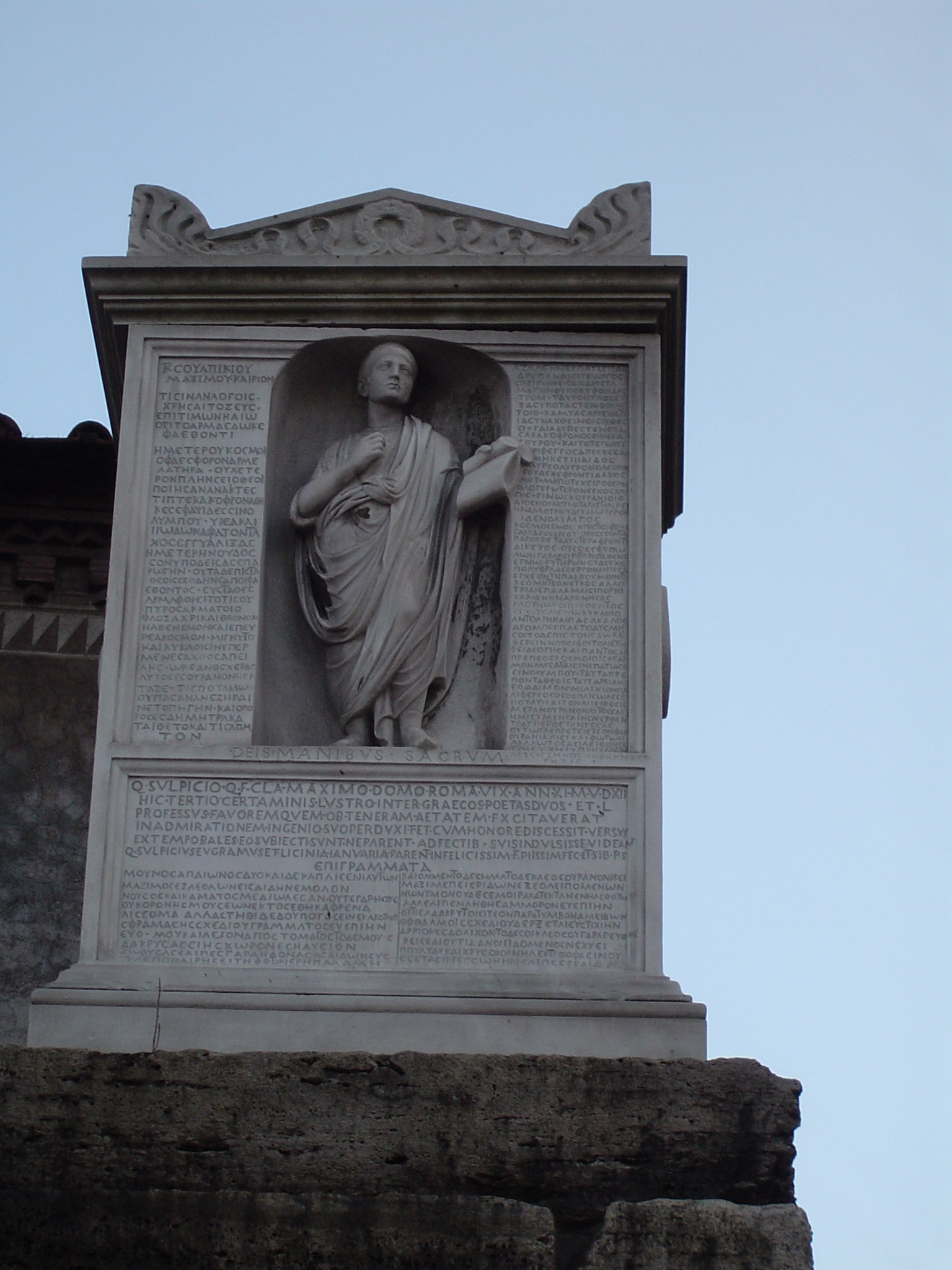Latin poetry on:
[Wikipedia]
[Google]
[Amazon]
 The history of Latin poetry can be understood as the adaptation of Greek models. The verse comedies of
The history of Latin poetry can be understood as the adaptation of Greek models. The verse comedies of
Plautus
Titus Maccius Plautus (; c. 254 – 184 BC), commonly known as Plautus, was a Roman playwright of the Old Latin period. His comedies are the earliest Latin literary works to have survived in their entirety. He wrote Palliata comoedia, the g ...
, the earliest surviving examples of Latin literature
Latin literature includes the essays, histories, poems, plays, and other writings written in the Latin language. The beginning of formal Latin literature dates to 240 BC, when the first stage play in Latin was performed in Rome. Latin literature ...
, are estimated to have been composed around 205-184 BC.
History
Scholars conventionally date the start of Latin literature to the first performance of a play in verse by a Greek slave, Livius Andronicus, at Rome in 240 BC. Livius translated Greek New Comedy for Roman audiences, using meters that were basically those of Greek drama, modified to the needs of Latin. His successorsPlautus
Titus Maccius Plautus (; c. 254 – 184 BC), commonly known as Plautus, was a Roman playwright of the Old Latin period. His comedies are the earliest Latin literary works to have survived in their entirety. He wrote Palliata comoedia, the g ...
( 254 – 184 BC) and Terence
Publius Terentius Afer (; – ), better known in English as Terence (), was a Roman African playwright during the Roman Republic. His comedies were performed for the first time around 166–160 BC. Terentius Lucanus, a Roman senator, brought ...
( 195/185 – 159? BC) further refined the borrowings from the Greek stage and the prosody of their verse is substantially the same as for classical Latin verse.
Ennius
Quintus Ennius (; c. 239 – c. 169 BC) was a writer and poet who lived during the Roman Republic. He is often considered the father of Roman poetry. He was born in the small town of Rudiae, located near modern Lecce, Apulia, (Ancient Calabri ...
(239 – 169 BC), virtually a contemporary of Livius, introduced the traditional meter of Greek epic, the dactylic hexameter, into Latin literature; he substituted it for the jerky Saturnian meter in which Livius had been composing epic verses. Ennius moulded a poetic diction and style suited to the imported hexameter, providing a model for "classical" poets such as Virgil
Publius Vergilius Maro (; traditional dates 15 October 7021 September 19 BC), usually called Virgil or Vergil ( ) in English, was an ancient Roman poet of the Augustan period. He composed three of the most famous poems in Latin literature: th ...
and Ovid
Pūblius Ovidius Nāsō (; 20 March 43 BC – 17/18 AD), known in English as Ovid ( ), was a Augustan literature (ancient Rome), Roman poet who lived during the reign of Augustus. He was a contemporary of the older Virgil and Horace, with whom ...
.
The late republic saw the emergence of Neoteric Poets, notably Catullus
Gaius Valerius Catullus (; 84 - 54 BCE), often referred to simply as Catullus (, ), was a Latin poet of the late Roman Republic who wrote chiefly in the neoteric style of poetry, focusing on personal life rather than classical heroes. His ...
rich young men from the Italian provinces, conscious of metropolitan sophistication, and looking to the scholarly Alexandrian poet Callimachus
Callimachus (; ) was an ancient Greek poet, scholar and librarian who was active in Alexandria during the 3rd century BC. A representative of Ancient Greek literature of the Hellenistic period, he wrote over 800 literary works in a wide varie ...
for inspiration. Catullus shared the Alexandrian's preference for short poems and wrote within a variety of meters borrowed from Greece, including Aeolian forms such as hendecasyllabic verse, the Sapphic stanza and Greater Asclepiad, as well as iambic verses such as the choliamb and the iambic tetrameter catalectic (a dialogue meter borrowed from Old Comedy).
Horace, whose career crossed the divide between the Roman republic
The Roman Republic ( la, Res publica Romana ) was a form of government of Rome and the era of the classical Roman civilization when it was run through public representation of the Roman people. Beginning with the overthrow of the Roman Ki ...
and empire
An empire is a "political unit" made up of several territories and peoples, "usually created by conquest, and divided between a dominant center and subordinate peripheries". The center of the empire (sometimes referred to as the metropole) ex ...
, followed Catullus' lead in employing Greek lyrical forms, identifying with Alcaeus of Mytilene
Alcaeus of Mytilene (; grc, Ἀλκαῖος ὁ Μυτιληναῖος, ''Alkaios ho Mutilēnaios''; – BC) was a lyric poet from the Greek island of Lesbos who is credited with inventing the Alcaic stanza. He was included in the canonical ...
, composing Alcaic stanzas, and also with Archilochus, composing poetic invectives in the Iambus tradition (in which he adopted the metrical form of the Epode or "Iambic Distich"). Horace was a contemporary of Virgil and, like the epic poet, he wrote verses in dactylic hexameter, but in a conversational and epistolary style. Virgil's hexameters are generally regarded as "the supreme metrical system of Latin literature
Latin literature includes the essays, histories, poems, plays, and other writings written in the Latin language. The beginning of formal Latin literature dates to 240 BC, when the first stage play in Latin was performed in Rome. Latin literature ...
."
Richard F. Thomas, ''Virgil: Georgics'' Vol. I, Cambridge University Press (1988), page 28.
See also
* Prosody (Latin) - the structural basis of verse in LatinReferences
* {{DEFAULTSORT:Latin Poetry Poetry movements Latin-language literature Poetry by language